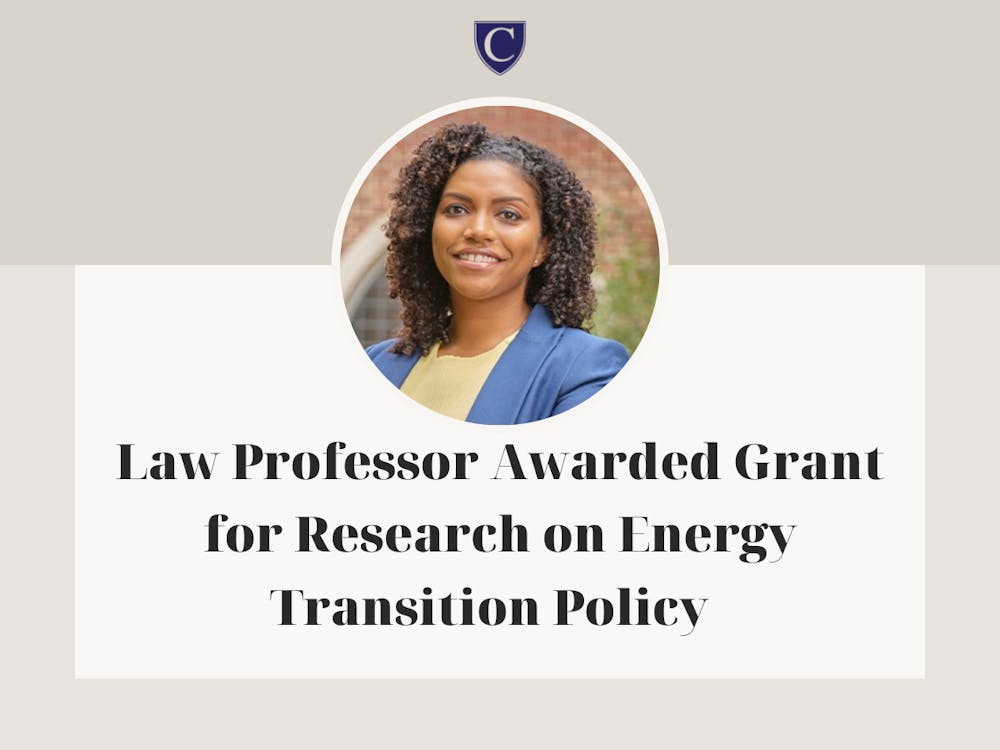Danielle Stokes, a University of Richmond professor of law, received grant support for a three-year research project centered on energy transition policy in February.
The $47,066 grant was awarded by the Alfred P. Sloan Foundation through Barry University.
The project, Just Energy Transitions and Place, seeks to study transitions in energy sources, such as fossil fuels to carbon-free, and their implications on health, the economy, land use and government regulations to then form policy recommendations for them, Stokes said.
With the help of her interdisciplinary team, composed of two specialists in urban and land planning, two geographers and four fellow law professors, Stokes will examine four case studies in unique geographic locations: Kansas, Louisiana, Pennsylvania and Florida, she said.
“We try to pick places where there will be expertise, but then also that we have sort of nuances within their regulatory structure that will help us find cool connections or have access to a lot of variety when we’re making our recommendations,” Stokes said.
Stokes counts herself fortunate to have been considered for the project and be a part of its diverse team of scholars that feature a variety of perspectives, she said.
This project and the research involved is a “big change” in the promotion of sustainability and the fight against climate change, Stokes said.
“Because energy is so critical to everything we do in our lives, if we don’t think about how to do that sustainably, we may not be here to think about a possible alternative,” she said.
This field of work is one that Stokes said she stumbled into.
After she finished law school, she worked at a law firm practicing land use and real estate law. From there, she transitioned from practicing law into academia, where the school she first taught at needed someone to teach environmental law. That was her first step into the subject, she said.
Her practical experience in property and renewable energy, combined with the interest she developed in environmental law through learning and teaching it, allowed her to think about these issues holistically with a just transition, she said.
“I think that’s a big piece, too, that drew me to the project. I was excited about the opportunity to think about the issue through a justice lens,” she said. “There’s a lot you can take away from the transition, both positive and negative, but I appreciate that we’re doing it with a focus on justice and equity.”
Enjoy what you're reading?
Signup for our newsletter
The grant she received for the project is an opportunity many law professors don’t get, she said. The main reason is that the application process requires substantial time and effort that academics in other legal fields are not always able or incentivized to do, she added.
However, applying for the grant was part of the excitement for Stokes as it “opened [her] eyes to a lot of other opportunities that are linked to partnering with people.,” she said.
“Just meeting new, interesting people who have a perspective that’s not like mine helps to inform how I think about issues and inform what I choose to highlight, or how I approach an issue that I may not have considered before,” Stokes said.
While her project will take her to new places, something called her back to UR in 2021, eight years after her 2013 graduation.
The access to resources, phenomenal professors, and innovative opportunities she had as a student at UR made her excited to come back since she knew she would be supported in the same way as a professor, she said.
Working here means “that if you have a great idea, people will support you and that idea to bring it into fruition,” Stokes said.
Contact features writer Grace Randolph at grace.randolph@richmond.edu.
Support independent student media
You can make a tax-deductible donation by clicking the button below, which takes you to our secure PayPal account. The page is set up to receive contributions in whatever amount you designate. We look forward to using the money we raise to further our mission of providing honest and accurate information to students, faculty, staff, alumni and others in the general public.
Donate Now



